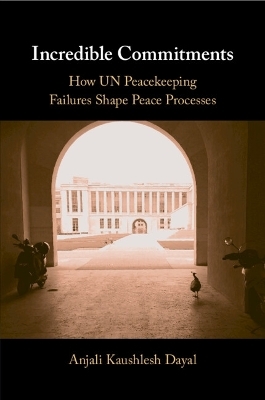
Incredible Commitments
How UN Peacekeeping Failures Shape Peace Processes
Seiten
2023
Cambridge University Press (Verlag)
978-1-108-82409-5 (ISBN)
Cambridge University Press (Verlag)
978-1-108-82409-5 (ISBN)
Why do warring parties turn to United Nations peacekeeping and peacemaking even when they think it will fail? This book asks why peacekeeping survived its early catastrophes and how this survival should make us reconsider how peacekeeping works. It will also appeal to readers interested in the Rwandan and Guatemalan civil wars and genocides.
Why do warring parties turn to United Nations peacekeeping and peacemaking even when they think it will fail? Dayal asks why UN peacekeeping survived its early catastrophes in Somalia, Rwanda, and the Balkans, and how this survival should make us reconsider how peacekeeping works. She makes two key arguments: first, she argues the UN's central role in peacemaking and peacekeeping worldwide means UN interventions have structural consequences – what the UN does in one conflict can shift the strategies, outcomes, and options available to negotiating parties in other conflicts. Second, drawing on interviews, archival research, and process-traced peace negotiations in Rwanda and Guatemala, Dayal argues warring parties turn to the UN even when they have little faith in peacekeepers' ability to uphold peace agreements – and even little actual interest in peace – because its involvement in negotiation processes provides vital, unique tactical, symbolic, and post-conflict reconstruction benefits only the UN can offer.
Why do warring parties turn to United Nations peacekeeping and peacemaking even when they think it will fail? Dayal asks why UN peacekeeping survived its early catastrophes in Somalia, Rwanda, and the Balkans, and how this survival should make us reconsider how peacekeeping works. She makes two key arguments: first, she argues the UN's central role in peacemaking and peacekeeping worldwide means UN interventions have structural consequences – what the UN does in one conflict can shift the strategies, outcomes, and options available to negotiating parties in other conflicts. Second, drawing on interviews, archival research, and process-traced peace negotiations in Rwanda and Guatemala, Dayal argues warring parties turn to the UN even when they have little faith in peacekeepers' ability to uphold peace agreements – and even little actual interest in peace – because its involvement in negotiation processes provides vital, unique tactical, symbolic, and post-conflict reconstruction benefits only the UN can offer.
Anjali Kaushlesh Dayal is an assistant professor of international politics at Fordham University.
Introduction; 1. The social context of international peacekeeping and the alternative benefits of bargaining; 2. Methods and case selection; 3. The Arusha negotiations, 1990-1994: Unamir in the shadow of Somalia; 4. Guatemala, 1989-1996: Minigua in light of El Salvador; Conclusion; Bibliography; Index.
| Erscheinungsdatum | 18.07.2023 |
|---|---|
| Zusatzinfo | Worked examples or Exercises |
| Verlagsort | Cambridge |
| Sprache | englisch |
| Themenwelt | Sozialwissenschaften ► Politik / Verwaltung ► Europäische / Internationale Politik |
| ISBN-10 | 1-108-82409-9 / 1108824099 |
| ISBN-13 | 978-1-108-82409-5 / 9781108824095 |
| Zustand | Neuware |
| Haben Sie eine Frage zum Produkt? |
Mehr entdecken
aus dem Bereich
aus dem Bereich
Studienbuch
Buch | Hardcover (2023)
De Gruyter Oldenbourg (Verlag)
44,95 €
erfolgreiche Interessenvertretung durch Prozesskompetenz im komplexen …
Buch | Hardcover (2023)
Wiley-VCH (Verlag)
42,00 €


